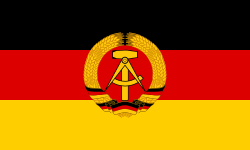| Name | Acronym | Sport | Founded | Number of athletes (1988) | Number of trainers (1988) |
|---|
| Allgemeiner Deutscher Motorsport Verband | ADMV  | Motorsports | 2 June 1957 | 85,134 | 5,064 |
| Deutscher Anglerverband | DAV  | Fishing | 13 May 1958 | 527,696 | 10,942 |
| Deutscher Basketball-Verband | DBV  | Basketball | 20 May 1958 | 14,644 | 1,243 |
| Deutscher Billard-Sportverband | DBSV  | Cue sports | 13 March 1958 | 11,009 | 1,369 |
| Deutscher Bogenschützen-Verband | DBSV  | Archery | 23 October 1959 | 4,668 | 545 |
| Deutscher Box-Verband | DBV | Boxing | 4 May 1958 | 20,908 | 1,868 |
| Deutscher Eislauf-Verband | DELV  | Ice sports | 31 August 1958 | 8,995 | 631 |
| Deutscher Faustball-Verband | DFV  | Fistball | 27 April 1958 | 10,779 | 1,345 |
| Deutscher Fecht-Verband | DFV  | Fencing | 20 July 1958 | 6,584 | 673 |
| Deutscher Federball-Verband | DFV | Badminton | 11 January 1958 | 27,069 | 2,480 |
| Deutscher Fußball-Verband | DFV  | Football | 17 May 1958 | 575,667 | 39,207 |
| Deutscher Gewichtheber-Verband | DGV | Weightlifting | 26 April 1958 | 25,630 | 2,465 |
| Deutscher Handballverband | DHV  | Handball | 21 June 1958 | 152,975 | 13,225 |
| Deutscher Hockey-Sportverband | DHSV | Hockey | 19 April 1958 | 6,152 | 576 |
| Deutscher Judo-Verband | DJV  | Judo | 19 April 1958 | 54,544 | 4,891 |
| Deutscher Kanu-Sport-Verband | DKSV | Canoeing | 19 April 1958 | 26,768 | 2,082 |
| Deutscher Kegler-Verband | DKV | Bowling | 30 March 1958 | 204,126 | 17,369 |
| Deutscher Verband für Leichtathletik | DVfL  | Athletics | 17 May 1958 | 180,605 | 15,583 |
| Deutscher Pferdesport-Verband | DPV  | Equestrian sports | 27 April 1961 | 53,818 | 5,951 |
| Deutscher Radsport-Verband | DRV | Cycling | 18 May 1958 | 27,226 | 2,816 |
| Deutscher Ringer-Verband | DRV  | Wrestling | 26 April 1958 | 23,686 | 2,106 |
| Deutscher Rollsport-Verband | DRV | Roller sports | 12 October 1958 | 4,704 | 381 |
| Deutscher Ruder-Sport-Verband | DRSV  | Rowing | 12 April 1958 | 14,275 | 1,103 |
| Deutscher Rugby-Sportverband | DRSV | Rugby | 20 April 1958 | 1,213 | 103 |
| Deutscher Shachverband | DSV  | Chess | 27 April 1958 | 43,374 | 4,523 |
| Deutscher Schlitten- und Bobsportverband | DSBV  | Bobsleigh and Sled sports | 28 September 1958 | 3,759 | 447 |
| Deutscher Schwimmsport-Verband | DSSV  | Swim sports | 4 May 1958 | 83,509 | 6,911 |
| Bund Deutscher Segler | BDS  | Sailing | 20 April 1958 | 31,318 | 2,231 |
| Deutscher Skiläufer-Verband | DSLV | Ski sports | 12 October 1958 | 48,438 | 4,100 |
| Deutscher Tennis-Verband | DTV  | Tennis | 26 April 1958 | 47,274 | 3,185 |
| Deutscher Tischtennis-Verband | DTTV  | Table Tennis | 4 April 1958 | 126,376 | 12,084 |
| Deutscher Turn-Verband | DTV  | Gymnastics | 3 May 1958 | 408,476 | 26,542 |
| Deutscher Verband für Versehrtensport | DVfV  | Disabled sports | 4 July 1959 | 14,080 | 1,249 |
| Deutscher Sportverband Volleyball | DSVB | Volleyball | 20 April 1958 | 134,924 | 12,454 |
| Deutscher Verband für Wandern, Bergsteigen und Orientierungslauf | DWBO  | Hiking, Mountaineering, and Orienteering | 15 June 1958 | 86,123 | 6,844 |
|


